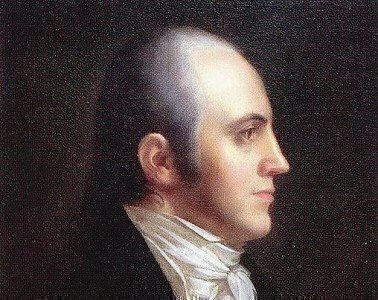Former vice president Aaron Burr usually isn’t credited as a Founding Father, but there is one instance where Burr directly helped to change the Constitution—by impelling the passage of the 12th Amendment after the constitutional crisis created by the 1800 election.
On June 15, 1804, New Hampshire voted to ratify the 12th Amendment after it was passed by Congress on December 9, 1803. New Hampshire assured the amendment's addition to the Constitution as the 13th state approving its text.
The Constitution as originally ratified in 1788 allowed for presidential electors to cast two votes. The candidate with the most votes became President and the second-place finisher was named the Vice President. That wasn’t a big issue when George Washington was elected by unanimous consent.
However, when bitter rivals John Adams and Thomas Jefferson finished first and second in the 1796 election, Adams was left with his biggest opponent as his Vice President.
The situation went from awkward to much worse in 1800, when Adams and Jefferson faced off in a rematch. Jefferson’s campaign included New York deal-making politician Aaron Burr as his intended Vice Presidential running mate. It is generally accepted today that the idea that the Jefferson-Burr electors would cast one less vote for Burr, ensuring Jefferson was the President and Burr the Vice President.
However, no one coordinated the voting and the two running mates tied for first place in the election. After the electoral votes were counted, Jefferson and Burr each had 73 votes, and tied as the winner. Worse yet, Article II sent the tie election to the House, which was controlled by Adams’s Federalist Party.
The House members could only vote for Jefferson or Burr, and not Adams, and then Burr made the controversial move to try to take the election from his own running mate, Jefferson.
The contingent runoff election between Jefferson and Burr was a true constitutional crisis. Jefferson ultimately won the House election on the 36th ballot after a week of voting. Alexander Hamilton, Jefferson’s long-time enemy, used his influence to support Jefferson instead of his old rival from New York, Burr.
Vowing to clean up what was clearly a flawed presidential election system, Congress made the 12th Amendment its first order of business in October 1803. After two months of debate, the House approved the 12th Amendment by a two-thirds margin, followed by the Senate.
During the state ratification process, the amendment was rejected by Delaware and Connecticut. After New Hampshire became the 13th state to ratify, the newly minted 12th Amendment was certified by Secretary of State James Madison in September 1804 in time for the next election, which Jefferson easily won.
The 12th Amendment made sure that separate electoral votes were counted for Presidential and Vice Presidential candidates.
“The Electors shall meet in their respective states and vote by ballot for President and Vice-President, one of whom, at least, shall not be an inhabitant of the same state with themselves; they shall name in their ballots the person voted for as President, and in distinct ballots the person voted for as Vice-President, and they shall make distinct lists of all persons voted for as President, and of all persons voted for as Vice-President, and of the number of votes for each, which lists they shall sign and certify, and transmit sealed to the seat of the government of the United States, directed to the President of the Senate,” the first part of the Amendment read.
Burr wouldn’t run for elected office again and the intervention of Hamilton in the 1800 election was one of many issues between the two men. On July 11, 1804, Burr fatally wounded Hamilton in a duel in Weehawken, New Jersey.








